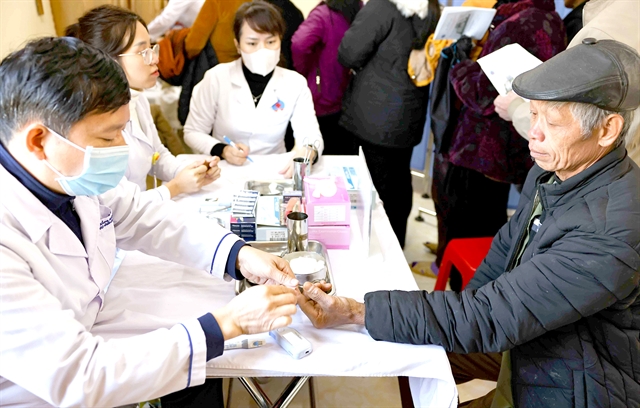 Society
Society

 |
| A resident from the northern province of Cao Bằng receives a health check-up from physicians at the Hữu Nghị (Friendship) Hospital. — VNA/VNS Photo Thanh Tùng |
HÀ NỘI — With non-communicable diseases now accounting for 70 per cent of deaths in Việt Nam annually, health experts are urging the promulgation of the Law on Disease Prevention as a comprehensive legal framework to improve the overall health quality of the population.
According to statistics from the Ministry of Health (MoH), non-communicable diseases take up two-thirds of the total national disease burden, with cardiovascular diseases, diabetes and cancer making up the majority.
About 15.3 per of the population aged 40-69 are at high risk (20 per cent) of experiencing cardiovascular events such as stroke and heart attack within the next 10 years. Out of this number, only 40.8 per cent have received medical counselling and are taking medications.
Associate Professor Dr Nguyễn Sinh Hiền, chairman of the Hà Nội Heart Association, said that the main causes for these health conditions stem from environmental risks, work and life pressures, habits of a sedentary lifestyle and unhealthy diets, including excessive meat and fried food consumption.
The MoH also reported that 19.5 per cent of the population is overweight, including 2.1 per cent diagnosed with obesity.
The rate of overweight and obese adults aged 19-65 rose from 12 per cent in 2010 to 19.6 per cent in 2020, a 1.6-fold increase over 10 years. About 44.1 per cent of the adult population has a high total cholesterol level (over 5.0mmol/L) or are taking cholesterol medications.
Meanwhile, non-communicable diseases are becoming more prevalent among younger age groups.
Each year, approximately 200,000 people in Việt Nam die from cardiovascular diseases, while the number of patients with cardiovascular issues increases by 10-20 per cent on an annual average.
Hiền said: “Cardiovascular diseases are the leading cause of death globally, more so than cancer. Statistics in Việt Nam show that about 25 per cent of adults suffer from cardiovascular diseases, with many emergency heart attacks occurring in patients under the age of 40.”
Diabetes is also increasing in prevalence. In Hà Nội, about 500,000 people are living with diabetes and 1.5 million with pre-diabetes, according to Dr Nguyễn Đình Hưng, deputy director of the city’s health department.
Only 50 per cent of them are diagnosed and undergoing medical treatment, and among these, only about 30 per cent receive quality care, he said. As a result, 50 per cent of diabetes patients already have cardiovascular complications at the time of diagnosis.
The political system must be involved in revising and updating current policies to ensure comprehensive health management, including the management of communicable and non-communicable diseases, nutrition, and mental health concerns.
While Việt Nam adopted the Law on Prevention and Control of Infectious Diseases, there is no comprehensive legal framework to address health risks such as environmental factors, nutrition or mental health, nor control over non-communicable diseases.
Therefore, a law on disease prevention is proposed to address these issues, aiming for an overall management of healthcare and laying a foundation to improve people’s quality of life and life expectancy.
Associate Professor Dr Trần Đắc Phu, former director-general of the MoH’s Department of Preventive Medicine, said that in disease prevention, addressing environmental and social risk factors is a must, followed by countermeasures against infectious diseases, non-communicable diseases and diseases of unknown causes.
These alarming statistics on non-communicable diseases highlight a significant challenge to the economy and society, underscoring the urgent need for a Law on Disease Prevention to cover comprehensive health-related issues for the entire population.
Phu said: “We already have the Law on Medical Examination and Treatment, so a disease prevention law is also necessary to ensure balance. As the old saying goes, ‘prevention is better than a cure’ - we need to take action so that people can live longer, healthier lives.” — VNS